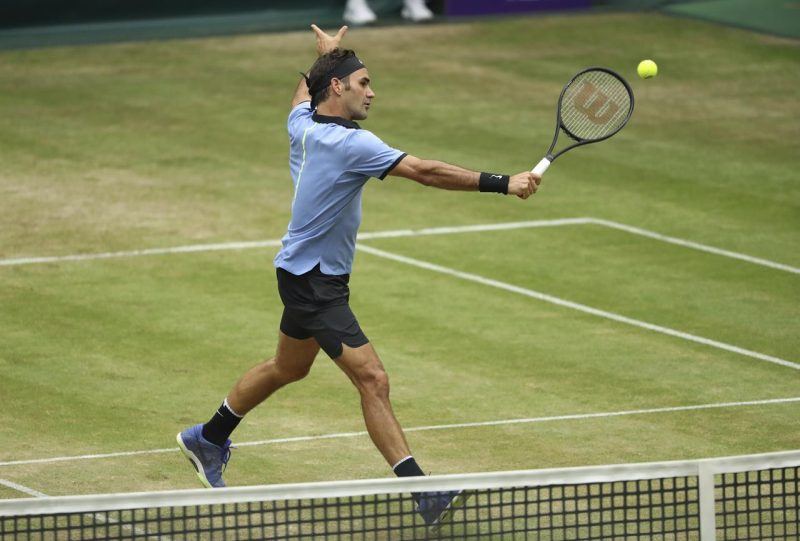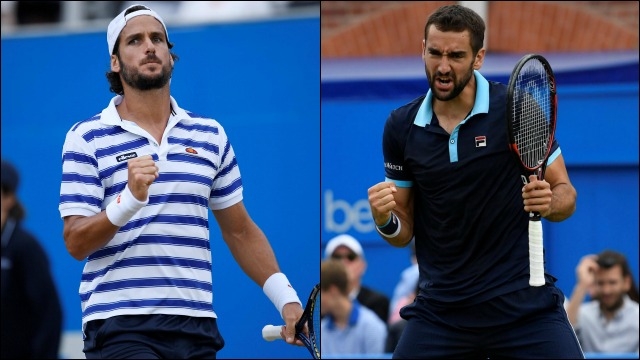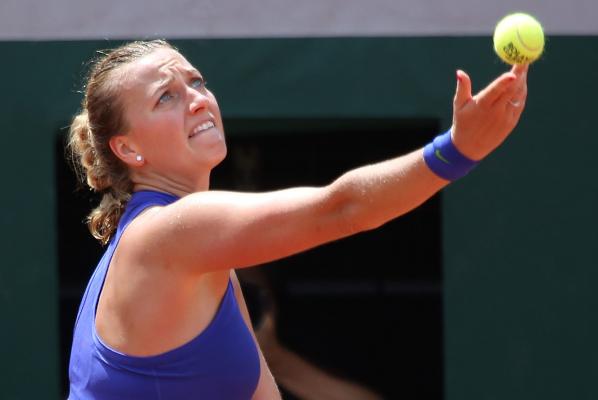Wimbledon will be really exciting if Roger Federer continues playing like he did to win his ninth Halle title in just 53 minutes on Sunday.
Roger Federer defeated Germany’s Alexander Zverev 6-1, 6-3 to win the Gerry Weber Open for a record ninth time on Sunday.
The bare numbers hardly tell the tale: 6-1, 6-3 to Federer, 58 points to 33 overall, winning 79% of his service points, 52% when receiving. He was razor sharp at the net, solid at the back, ruthless in the finish.
Playing in his 140th career final, Federer saved the only break point he faced and converted four of his eight opportunities to clinch his 92nd career title in 53 minutes. At 35, the Swiss player became the oldest winner of the grass-court tournament.
“I played unbelievably well. I felt good and never let up,” said Federer, who dropped just nine points on his serve. “It was my best game this week. Nearly everything worked out for me.”
Federer, who skipped the clay-court season after winning the Miami Open in early April, claimed his fourth title of the year, matching Rafael Nadal‘s tally, and he will be seeded ahead of his Spanish rival for Wimbledon, which starts in eight days.
Federer had already won the Australian Open before titles in Indian Wells and Miami in 2017.
The 18-time Grand Slam champion was surprised by German veteran Tommy Haas on his return from the two-month break last week in Stuttgart but brushed off any doubts over his form in Halle.
Against the 20-year-old Zverev, who lost last year’s final to Florian Mayer, Federer raced to a 4-0 lead before wrapping up the first set in 22 minutes. Zverev created his only break chance in the opening game of the second but ultimately was unable to show why he is regarded as one of the sport’s brightest prospects.
“You could have been a bit nicer and allowed me a couple more points,” Zverev joked to his idol.
Federer had words of affection for Zverev, who won their semifinal in Halle last year.
“He’s a very nice lad. I’m very happy for him, how he’s developed in the last years. The future belongs to him,” Federer said.
There was hardly an area of the game Federer did not dominate for extended periods, although the rallies rarely went longer than a few shots. Zverev, who had been so impressive all week, rushed his counters, botched several winners and at no point was really in the contest.
This was a statement match for both of them, brought together for a third time at opposite ends of their careers. The 20-year-old German wears his hair fashionably long; the 35-year-old Swiss recently had a serious short back and sides, reaching for the look of youth, perhaps. Inside a minute, Federer broke Zverev to love: the tennis equivalent of Anthony Joshua knocking out a young contender with the first punch of the fight.
Zverev, who had lost his first eight matches against top‑10 players then beaten seven of the next 11 – including Federer in the semi-finals here last year – encountered the Swiss on one of his magical days. He was 0-3 down after 10 minutes. Twenty minutes in, Federer had three set points. Zverev hit long. Embarrassment loomed.
Federer gifted him a break with a sloppy forehand but quickly repaired the damage. In the final point of the third game of the second set, Zverev hunted down one of Federer’s many drop shots, slid under the net and jarred his left ankle. The old man in the bandana gave him a consoling pat on the back then resumed his systematic beating.
A final, imperious backhand volley put Zverev out of his agony. He took his licks graciously but, if it was a street fight, someone would have called the police.
“I don’t know if I’m ever going to win this tournament again,” Federer said in English courtside. “So I’m just going to enjoy it as much as I can.” He had to be kidding. Having watched Rafael Nadal compile La Décima three times on clay this summer, Federer will strain every sinew to post just one on the grass of Halle. He might even get an eighth title on the grass of Wimbledon and then can start dreaming anew.
Marin Cilic and Feliciano Lopez recovered from having their serves broken for the first time this week to secure returns to the final of the Queen’s grass-court tournament on Saturday.
Cilic, the 2012 champion, ended Gilles Muller’s seven-match winning run on grass with a 6-3, 5-7, 6-4 victory in the first semifinal.
Lopez then gained a measure of revenge for his loss to Grigor Dimitrov in the 2014 final by beating the Bulgarian 7-5, 3-6, 6-2 in a hard-fought contest that was delayed mid-match by the first bout of heavy rain this week.
It’s not the title match many would have predicted at the start of the week, with Andy Murray, Stan Wawrinka, and Milos Raonic – the top three seeded players – all getting eliminated in the first round. But it still contains two strong grass-court players who will be gaining plenty of confidence heading into Wimbledon, which starts on July 3.
“I am so happy to be in the final; it’s one of the most special tournaments for me. I have wanted to win this tournament so bad,” said No. 32-ranked Lopez, who expressed delight that Cilic was playing in a semifinal of the doubles on Saturday evening.
That was suspended near the end of the second set, with Cilic and Marcin Matkowski leading 6-1, 3-5 against Jamie Murray and Bruno Soares. That match will conclude after the singles final on Sunday. Cilic is bidding to become the first man since Pete Sampras in 1995 to win the singles and doubles titles at one Queen’s.
The fourth-seeded Cilic certainly looks the fresher after four singles matches this week, with Lopez initially appearing jaded against Dimitrov following his tough three-set win over Tomas Berdych in the quarterfinals. Lopez remained rooted in his seat, head in his hands, after clinching victory on Centre Court.
It took nearly nine sets this week for Lopez to lose his serve, helping Dimitrov take the semifinal to a deciding set. The left-handed Spaniard pounced on Dimitrov’s sudden weakness on his topspin backhand, wasting six break-point opportunities in the 10th game but succeeding in the sixth game when the sixth-seeded Dimitrov volleyed into the net.
“We had a great battle in the 2014 final, so I knew it would be tough,” said Lopez, referring to a match that featured three tiebreakers.
“I was playing some of the best tennis of the whole week,” he added.
Cilic is guaranteed to be at least No. 6 in the rankings, which is a career high, after dealing Muller a first loss of the grass-court season following the left-hander’s title win in Netherlands last week.
Cilic sent a backhand down the line to clinch the sixth game of the match and the only break of the first set. His serve remained dominant until the final game of the second set when he went 0-40 and was broken on the second set point.
It proved to be a momentary lapse, as Cilic regained control and converted his second match point when he fired down a second-serve ace.
“Today’s match was an extremely high level,” Cilic said. “I was playing really, really good throughout and Gilles was pushing me to the limit. I was mixing it up really well and just playing really smart in some critical points.”
Cilic, a former U.S. Open champion, looks like being a danger at Wimbledon, where he has reached the quarterfinals in the past three years.
Two-time Wimbledon champion Petra Kvitova beat Lucie Safarova in the Aegon Classic semifinals on Saturday to reach the first final since her playing hand was injured in a knife attack at her home.
This is Kvitova’s first grass-court final since her triumph at 2014 Wimbledon, though this significant achievement was tinged with anti-climax as Safarova quit with a right thigh strain after only eight games. Kvitova was leading 6-1, 1-0.
Nevertheless, Kvitova hit her groundstrokes with pace and accuracy, especially from the forehand side.
In the final, the Czech leftie will play Ashleigh Barty, an Australian who was impressive in containing former French Open champion Garbine Muguruza 3-6, 6-4, 6-2.
Whatever happens, Kvitova was already delighted with her progress.
“The hand is good, which is the best news I could have,” she said. “I am not feeling any pain.”
Remarkably, she’s playing only her second tournament and only her sixth match since she was attacked in December.
Asked if the comeback had gone better than expected, she replied: “Yes. I could not have imagined a better comeback.” But she remained reluctant to agree that she was now one of the players who could win Wimbledon.
Her win had a hint of inevitability from the start, for she had prevailed in all nine previous encounters against Safarova, a former world No. 5. Kvitova captured 14 of the first 15 points and the first five games.
After losing her service game at the start of the second set, Safarova shook hands and departed. She had been suffering from exhaustion as well as a thigh strain, having played two monster matches in her previous three wins.
“I am sorry for Lucie and hope she soon gets a bit better, but I love playing finals,” Kvitova said. “I like big matches, and I’ve missed it over the last six months. So this is quite a dream.”
She will go for her 20th career title in her 27th final.
Barty was ranked at 271 at the start of the year, won her first career title in March in Kuala Lumpur, and has become the first Aussie finalist here in 25 years.
From the moment she broke serve for 3-2 and consolidated for 4-2 in the second set, it was clear Barty had a formula which had a good chance of working.
She sliced the ball hard, kept it wide and low, and denied Muguruza chances to develop pace and rhythm with her elegant groundstrokes. Given a glimmer of a chance to counterattack with rolling forehands, Barty always took it, and more often than not hit her targets.
Muguruza called for her coach, sought to swing the ball around, and eventually just tried to scrap as best she could. But Barty gained adrenaline and self-belief from her second set success, and five games in a row from 0-1 in the final set effectively decided the outcome.
“I will keep playing this way, and I know that sooner or later I will get the chance of getting another trophy,” said Muguruza, for whom this tournament has been mental rehab after her title-losing trauma in Paris two weeks ago.
Barty was ebullient. “I executed exactly the way I wanted to,” she said. “I like slicing it around on the grass, and I didn’t do much wrong.”




